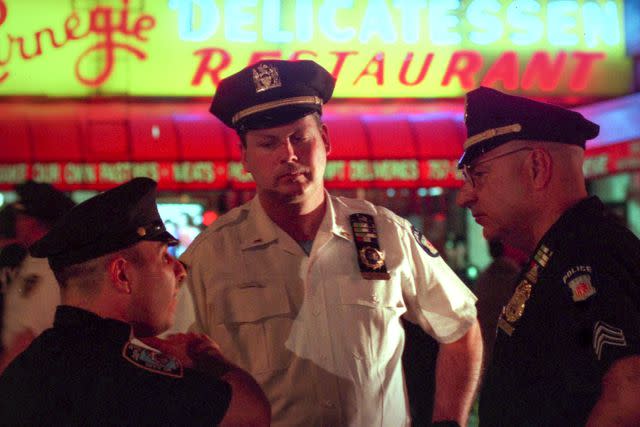“Homicide: New York” review: Grisly true-crime tales told with care
- Oops!Something went wrong.Please try again later.
Netflix's new docuseries from Dick Wolf revisits five notorious New York murders.
Dick Wolf, the supreme ruler of the Law & Order universe, knows better than to fix what isn’t broken. Every episode of his new Netflix docuseries, Homicide: New York, begins with this déjà-vu inducing prologue: “On the island of Manhattan there are two detective squads dedicated to homicides: Manhattan North and Manhattan South. They investigate the most brutal and difficult murders. These are their stories.” The “chung chung” is implied.
This isn’t Wolf’s first foray into true crime, and once again the uberproducer is not looking to upend a time-tested formula. What makes Homicide an above-average true-crime experience is its creator’s eye for intriguing characters. The five-part series ensures that we see the men and women who solved and prosecuted these murders as human beings, people with insecurities, idiosyncrasies, and regrets — not just talking heads.

Netflix
Cops on the scene at New York's Carnegie Deli in 'Homicide: New York'Everything about Homicide is extremely New York, from how the featured detectives talk (“I interrupted [my partner], ‘cause he was eatin’ a f---in’ Suzy Q and drinkin’ a Yoo-hoo, which was his dinner of choice”) to the notable crime scenes — including Carnegie Deli, Central Park, and the Financial District. Each episode follows a loose Law & Order template, chronicling the crime and subsequent investigation — lasting anywhere from 10 days to 21 years — before shifting to the prosecution of the accused.
While the motives and methods of the murders highlighted in Homicide all vary, they each tap into the primal fears that elevate a crime from statistic to morbid media sensation: Random violence (the 44-year-old murder of Michael McMorrow by a pair of 15-year-old private school students); kidnapping (the disappearance of Eridania Rodriguez, a 46-year-old cleaning woman, inside a downtown high-rise); home invasions (the execution-style shooting of Jennifer Stahl, 39, and four of her friends in her apartment above Carnegie Deli); serial killers (the East Harlem Rapist, who terrorized the upper Manhattan neighborhood for over seven years); and deadly greed (the brutal stabbing death of millionaire Howard Pilmar inside his Midtown office).
Most true crime shows center on shocking events, of course. But Homicide works as well as it does because the folks who investigated and prosecuted these grim cases are both excellent raconteurs and fascinating figures in their own right. Retired Midtown North Detective Rob Mooney, a lifelong Deadhead, credits the “diversity” of the Grateful Dead fan base for helping him ID the unlikely perpetrators — two baby-faced teens — of the McMorrow murder. “You don’t judge a book by its cover,” he notes. “And in this case, it turned out to be true.” There are a lot of qualities that make up a good detective — tenacity, attention to detail, approachability — but Homicide reveals how important personal quirks can be to the work. Just give Detective Brian MacLeod his earbuds and some heavy metal music and he can scour through hours of surveillance footage without losing focus — which was key to breaking the Rodriguez case. After hours of failed interrogations by her colleagues, retired Detective Irma Rivera — who grew up in the Alphabet City housing projects and sees “something good” in every criminal she interviews — succeeded in cracking a suspect in the Carnegie Deli massacre.
Historical spoiler alert: Every one of the cases included in Homicide end with the killers behind bars, but heart-rending interviews with the victims’ families and friends emphasize the chasm that remains between a conviction and justice. Frank Pilmar is still tortured by the belief that he could have done something to save his son, Howard. “When I go to bed every night, I talk to him,” says Frank, now 95. “But I can’t get any answers.”
As previously noted, Homicide is a Dick Wolf joint — and as such, it generally views law enforcement in a positive light. (If you’re looking to stream projects that focus on darker chapters in NYPD history, check out Crime + Punishment on Hulu, The Seven Five on Tubi, or When They See Us on Netflix.) Even so, the detectives we get to know in Homicide are quick to scrutinize themselves. “What did I miss? Could I have paid more attention to something?” wonders retired detective Scott Wagner, who unwittingly interviewed one of the murderers years before he was caught. “That question still bothers me today.” For these officers, some cases are never really closed. Grade: B+
Homicide: New York premieres Wednesday, March 20, on Netflix.
Sign up for Entertainment Weekly's free daily newsletter to get breaking TV news, exclusive first looks, recaps, reviews, interviews with your favorite stars, and more.
Related content:
Last Call review: HBO's serial killer doc is powerful and infuriating
Stolen Youth review: Hulu's Sarah Lawrence cult doc is a tough watch
Read the original article on Entertainment Weekly.

